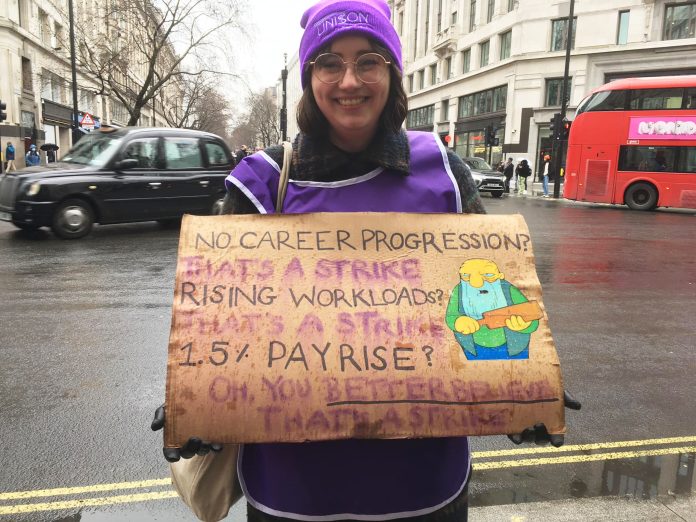Public sector union Unison’s October National Executive Council (NEC) meeting took place as the Israeli state’s bombardment of Gaza was escalating. The NEC has a small left majority, including the ‘Time for Real Change’ group, which is the biggest grouping on the NEC. But the Unison general secretary, Christina McAnea, comes from the previous right-wing dominated leadership.
Unison was urged to strongly condemn the Israeli state’s bombing of Gaza by Israel and fully support a ceasefire, and to make it clear that Unison’s position was in direct contrast to the Tories’ and Keir Starmer’s position of supporting Israel’s attacks. Starmer was sharply criticised for banning Labour MPs and councillors from attending Gaza demonstrations, much like he banned Labour cabinet members from attending picket lines.
Left NEC members argued that Unison must encourage members to attend the Gaza protests with visible branch banners. The discussion reflected the pressure of the members on the general secretary, who is a supporter of Keir Starmer’s Labour leadership, and means that Unison has now adopted the position of calling for a ceasefire.
The pay strike wave continues, with ongoing strikes in schools and early years in Scotland, Higher Education and the Environment Agency. In Scotland, there had been an improved offer on pay, but in a consultation, this was met with a 97% rejection on a 57% turnout because of the very vague offer.
There has been a myriad of strike action in schools and other workplaces. A message of support was agreed for Ashfield Academy, a special educational needs school in Leicester. The Camden parking wardens strike was highlighted for successfully achieving a significant pay rise following all-out strike action. They achieved £15.90 per hour, leading to some members receiving up to £5,000 with back pay.
There was some discussion of this year’s national pay campaign in local government, but as at that stage the GMB ballot result was still to be announced, the NEC will review the 2023 pay campaign and begin preparing for 2024 at its December NEC. The 2023 pay campaign has now ended, after GMB had “not secured enough mandates to pursue effective industrial action”.
Unison agreed to launch a campaign on equal pay following the crisis in Birmingham, with the Labour council issuing a Section 114 notice and Tory commissioners coming in to run the council.
The national Unison leadership was criticised by NEC members for not leading the equal pay campaign and consequently losing school members to GMB, which was seen to fight on the issue. It was reported that members in Birmingham were fearful of mass job cuts and privatisation, and are discussing an industrial action strategy. Under the general secretary’s report, Socialist Party member April Ashley proposed a message of support, but that was declined by the general secretary, on the basis that there were many other branches also fighting back against cuts and redundancies!
Socialist Party members argue that Birmingham council should have set a no-cuts needs budget and mounted a campaign to win the funding necessary from the government, instead of caving in to Tory demands for cuts. This is the position agreed by the National Education Union branch in Birmingham, but unfortunately is not demanded by Birmingham Unison.
Funding cuts to local government amount to £3.5 billion and the union has rightly called on the Tories to fully fund local government. But, in reply to a question by April, the general secretary said that Unison will not write to Labour to demand it funds local government, on the basis that Labour is not detailing its funding commitments now to avoid attack by the Tory press. She did say, however, that Unison will “hold Labour to its commitments,” including on workers’ rights.
But in his insistence on ‘fiscal responsibility’, Keir Starmer has made it quite clear that he will not deliver on workers’ demands for full funding, inflation-proof pay rises, an end to privatisation in the NHS etc. That is something the right-wing general secretary wants to cover over, in order to not rock the boat. The left NEC should stand up to that approach. It is essential we have a leadership of Unison that is prepared to put demands on Starmer in the interests of its members and that is prepared to fight no matter who is in power.
The NEC called for the minimum service level legislation to be a high priority campaign for Unison. Unison should call on the Trades Union Congress (TUC) to act urgently on the decisions made at Congress in September.









